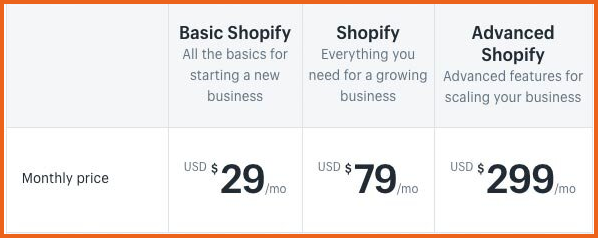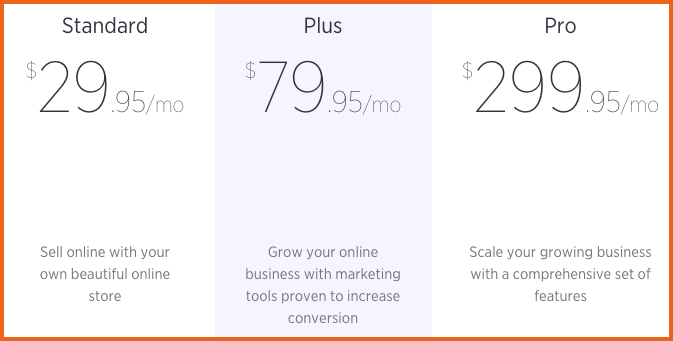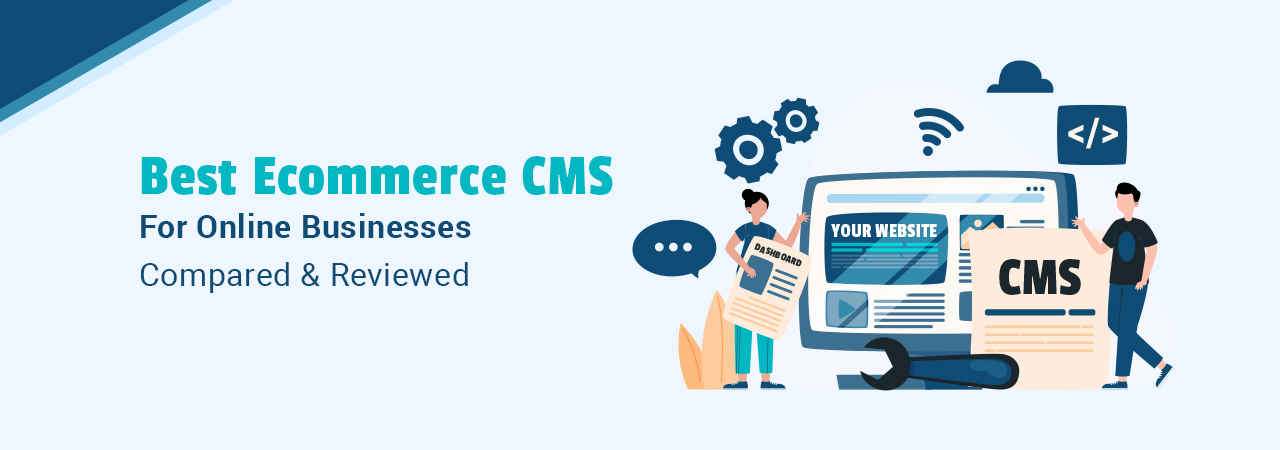This is the age of ecommerce. Online transactions hit a record high in 2020. According to Statista.com, an estimated 1.92 billion people worldwide purchased goods or services online in 2019. Global ecommerce sales accounted for almost 15 percent of all retail sales in the same year which is expected to reach 22 percent by 2023.
The current trends in ecommerce are enough to prove that it is only going to grow in the coming years. There are millions of ecommerce stores worldwide with hundreds of stores being created every single day. Everyone wants to get their share of the booming industry.
One of the first challenges that pop up after you have decided to start an ecommerce store is what CMS (Content Management System) to use. There are a bunch of ecommerce content management systems in the market each one with its pros and cons. This article makes your search easier as we are going to list down the top 5 best CMS for ecommerce that are going strong in 2021. Check this ecommerce CMS comparison and select the one that best suits your business needs.
1. Shopify
Shopify is one of the leading and fastest growing ecommerce solutions. Over 1 million stores are using it and have generated $319bn in sales between 2016 and 2019. One of the key features that make Shopify a preferred choice for users is its ease of use. It lets you build a fully functional online store without technical skills or the assistance of a developer or designer. It offers hundreds of built-in themes which you can customize according to your own branding requirements. Shopify is a ‘hosted’ solution which means that it runs on its own servers and you don’t have to buy web hosting or install software anywhere.Pros:
- It offers a 14 day free trial.
- It’s easy to use.
- The templates are attractive and mobile friendly.
- Multi-currency selling is possible although you have to rely on an app to implement it.
- It supports multi-language although some limitations in functionality may apply.
- It comes with a free email marketing tool which lets you host a list of up to 2,500 subscribers for free.
- It comes with a built-in blog.
- Both iOS and Android apps are provided to enable you to manage your store on the go.
Cons:
- It requires you to extend your store’s functionality by installing paid (not all) third-party apps.
- Adding custom fields such as text boxes or file upload options is complicated or requires installation of an app.
- The built in payment processor, Shopify Payments, only allows you to sell from certain countries. Third-party payment gateways come with a transaction fee.
Pricing
Shopify offer the following pricing plans.
2. WooCommerce
WooCommerce is another widely popular ecommerce CMS with over 4 million online stores using it. It’s a free WordPress plugin that turns your WordPress site into an ecommerce store. Countless free and premium themes and over 400 official extensions help you to design and enhance your store’s functionality. However, it’s not as easy as Shopify and you need basic know-how of how WordPress works. You might need the help of a developer if you need to do extensive customization. WooCommerce also integrates with hundreds of solutions, including Facebook, Sage, Zapier, MailChimp, ShipStation, Square, Stripe, Fulfilment by Amazon, and more.Pros:
- WooCommerce is free to use and distribute.
- It is 100% customizable and flexible.
- It gives you full control of your content and store.
- It has a wide variety of themes and plugins.
- A large community, extensive documentation, and tutorials make it easy to solve any issue.
- It has readily available support.
- It comes with a built-in blog.
- It has the extensive capability of built-in WordPress blog.
Cons:
- Requires knowledge of WordPress and WooCommerce.
- Even though the core WooCommerce plugin is free, many extensions are not.
- Capital costs for a WooCommere site need to be budgeted for. It is not cheap.
- Specialist E-commerce site builders are needed in order to implement a robust site.
- On-going maintenance is the responsibility of the store owner.
- WooCommerce by itself will not fulfill the E-commerce funnel.
Pricing
The plugin is free but you have to bear the hosting and third party payment gateway costs.3. BigCommerce
BigCommerce is probably the strongest alternative to Shopify. Like Shopify, it is a ‘hosted’ ecommerce solution that comes with 12 free and 150 paid themes and a wide range of marketing tools. The thing that makes BigCommerce stand out among its competitors is that its entry-level plan gives all the key ingredients required for an online store including multiple currencies. BigCommerce also allows you to create a very large number of product variants unlike Shopify which only allows 3.Pros:
- There are no transaction fees, even if you use a third-party payment gateway.
- You get professional reporting tools on all plans.
- Third party real time shipping calculations are available on any plan.
- It’s really easy to create custom fields.
- It offers great SEO features such as creating short URLs, AMP format, and automatic image optimization.
- You get an unlimited number of staff accounts on any plan.
- It comes with a built-in blog.
Cons:
- Abandoned cart functionality is not included in the standard plan.
- There are limits on annual sales limit. For more sales, you have to upgrade your plan.
- Unlike some competing products, there are no shipping discounts available on any plan.
- The built-in blog doesn’t facilitate RSS feeds.
Pricing

4. Magento
Magento is another open source ecommerce heavyweight with over 250,000 stores relying on its powerful features. Magento is most suited for medium-sized businesses and large enterprises owing to its high pricing. Although the Magento Open Source edition is available for free, you will require many extensions to customize it. It also requires expert knowledge to create & customize an online store in Magento.Quick Note: Check this extensive list of Magento 2 Extensions developed by FME.Magento marketplace offers hundreds of Magento extensions to increase your store’s functionality. The CMS provides some out of the box features such as full page cache, CDN (content delivery network), and advanced database options that greatly improve the store’s performance. It also has multiple stores, multi-currency, and multi-language capabilities.
Pros:
- Magento is 100% flexible and scalable so you can add unlimited products to your store.
- You get excellent SEO features.
- Magento is mobile friendly.
- You can customize your store the way you want.
- Store management is easy.
Cons:
- Magento is expensive.
- It’s not easy to create an e-store in Magento.
- Magento needs a good hosting environment.
- Magento has poor technical support.
5. PrestaShop
Prestashop is yet another open-source ecommerce solution for a CMS that is a good fit for small and medium stores. Prestashop web development requires fewer resources/servers than some other options; however it also can limit scalability. Because of this, it’s definitely more of a fit for small businesses just starting out. The software is free to download and you can install it on your own server or use a hosted version. There are around 1.5 lac PrestaShop based online stores across the world. At present, PrestaShop is available in 65 international languages.Pros:
- Prestashop is great for low budget stores.
- 25000+ prestashop modules help you add any functionality you want to your store.
- The platform offers great promotional tools such as coupons, vouchers, deals.
- Customization is easy.
Cons:
- Modules can sometimes be difficult to work together.
- Modules can be very costly.
- PrestaShop Ready has limited options to help you grow your business.
Pricing
The software is free but you have to bear the hosting and third party payment gateway costs.Conclusion
It is clear from the above discussion that no single ecommerce CMS is a best fit for all types of stores and businesses. Each comes with its own strengths and limitations and based upon your business requirements and objectives, it is up to you to decide which one will work best for you. To make this decision further easier for you, consider the following takeaways.- If you are to build a dropshipping store with low budget and zero technical skills, Shopify is hands down the ultimate solution.
- If you can work with WordPress and want to implement all the basic functionalities of an online store within limited budget, go for WooCommerce.
- If you want all the features of a fully functional and scalable online store no matter the nature of your business in an entry level plan, BigCommerce is for you.
- If you are a large business, open on budget and prefer unlimited scalability, super performance, and customization, Magento is your go to solution.
- If you are a small to medium sized business and have mid-level technical skills, go for PrestaShop.

